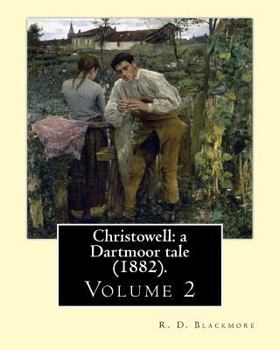Christowell: a Dartmoor tale (1882). By: R. D. Blackmore (Volume 2).In three volume: Christowell: a Dartmoor tale is a three-volume
Select Format
Select Condition 
Book Overview
Christowell: a Dartmoor tale is a three-volume novel by R. D. Blackmore published in 1882. It is set in the fictional village of Christowell on the eastern edge of Dartmoor. Plot introduction The complex and picturesque life which goes on in the parish of Christowell is the theme of the novel.The story begins with the garden where resides "Captain Larks," alias Mr. Arthur, who is neither Mr. Arthur nor "Captain Larks," but a mysterious soldier who renounced his own good name to save one who was his brother and fellow officer from disgrace. Misfortune has driven him into retirement, and so he lives among his flowers and fruit. Nobody knows anything about him, save the clergyman, Parson Short.Mr. Arthur has a daughter, Rose, who, after visiting him as a child during her holidays for several years, at last comes to live with him at his cottage. It is when she appears, however, that her father's troubles may be said to begin; for she falls in love with Jack Westcombe the son of a retired officer, whom Rose's father declines to see, conscious of the cloud that rests on himself. Among other characters there are Pugsley the carrier, Sir Joseph Touchwood, who has made a fortune out of shoes supplied by contract to Lord Wellington's army, Julia Touchwood, and a Richard ("Dicky") Touchwood who achieves small honors at Cambridge, but greater ones at home as a rat-catcher. The villain of the plot is a Mr. Gaston who attempts every crime from murder to bribery to compass his ends, and succeeds in hoodwinking every one for some time and keeping Mr. Arthur out of his lawful inheritance........ Richard Doddridge Blackmore (7 June 1825 - 20 January 1900), known as R. D. Blackmore, was one of the most famous English novelists of the second half of the nineteenth century. He won acclaim for vivid descriptions and personification of the countryside, sharing with Thomas Hardy a Western England background and a strong sense of regional setting in his works. Blackmore, often referred to as the "Last Victorian", was a pioneer of the movement in fiction that continued with Robert Louis Stevenson and others. He has been described as "proud, shy, reticent, strong-willed, sweet-tempered, and self-centred." Apart from his novel Lorna Doone, which has enjoyed continuing popularity, his work has gone out of print. Biography: Richard Doddridge Blackmore was born on 7 June 1825 at Longworth in Berkshire (now Oxfordshire), one year after his elder brother Henry (1824-1875), where his father, John Blackmore, was Curate-in-charge of the parish. His mother died a few months after his birth - the victim of an outbreak of typhus which had occurred in the village. After this loss John Blackmore moved to Bushey, Herts, then to his native Devon, first to Kings Nympton, then Culmstock, Tor Mohun and later to Ashford, in the same county. 2] Richard, however, was taken by his aunt, Mary Frances Knight, and after her marriage to the Rev. Richard Gordon, moved with her to Elsfield rectory, near Oxford. His father married again in 1831, whereupon Richard returned to live with him. Having spent much of his childhood in the lush and pastoral "Doone Country" of Exmoor, and along the Badgworthy Water (where there is now a memorial stone in Blackmore's honour), Blackmore came to love the very countryside he immortalised in Lorna Doone...........
Format:Paperback
Language:English
ISBN:197601381X
ISBN13:9781976013812
Release Date:September 2017
Publisher:Createspace Independent Publishing Platform
Length:96 Pages
Weight:0.46 lbs.
Dimensions:0.2" x 8.0" x 10.0"
Customer Reviews
0 rating





